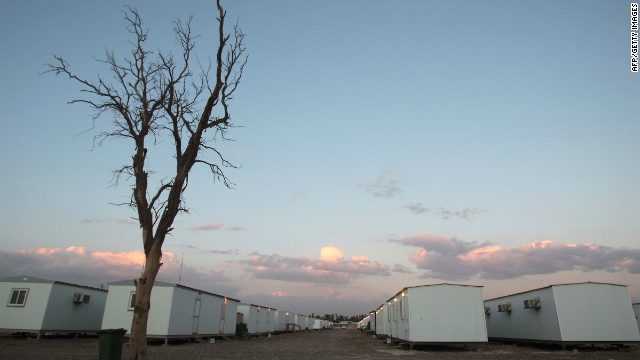About 400 members of an exiled Iranian opposition group who are the first to leave a long-term camp in Iraq under a U.N. plan criticized their treatment and the conditions at the new temporary  site Saturday.
site Saturday.
The group left Camp Ashraf at midnight following 12 hours of inspections and checks, Shahin Gobadi of the National Council of Resistance of Iran said in a statement.
When they arrived seven hours later at the new site, a former U.S. military base near Baghdad International Airport called Camp Liberty, the group discovered a heavy presence of police.
Another inspection was then demanded, prompting the residents to protest what they consider “degrading, humiliating and inhumane treatment” and the obstructive behavior of the Iraqi forces by refusing to leave the transit buses, Gobadi said.
“The preliminary reports indicate that Camp Liberty is a prison from all aspects,” he added.
The group’s relocation to the new site was agreed between the United Nations, Iraqi authorities, the United States and the European Union.
From there, the U.N. High Commissioner for Refugees will begin efforts to resettle the group outside of the country.
Martin Kobler, the U.N. secretary general’s special representative and head of the U.N. Assistance Mission for Iraq (UNAMI), was at the temporary site to welcome the new arrivals.
“This is the first step towards a better future outside Iraq,” he said. “I look forward to their continued cooperation with the Iraqi authorities to complete the relocation without delay.”
He also praised the Iraqi for having ensured the “safe and secure relocation” of the first group of residents and urged them to guarantee the human rights and safety of all those still to relocate.
Camp Ashraf has been home to members of the Mujahedin-e Khalq, or MEK, for more than 25 years. More than 3,000 exiles, described as Iranian resistance figures and their sympathizers, live at the camp.
The MEK has been on the U.S. terrorism list since 1997 because of the killing of six Americans in Iran in the 1970s and an attempted attack against the Iranian mission to the United Nations in 1992. However, since 2004, the United States has considered the residents of Camp Ashraf “noncombatants” and “protected persons” under the Geneva Conventions.
Before moving, the Camp Ashraf residents had demanded a commitment that no Iraqi police would remain inside the new site, in order to ensure the security of the residents. The group believes the current regime in Iraq, under orders from Prime Minister Nuri al-Maliki, has previously staged deadly attacks against Camp Ashraf.
Instead, there are several police posts inside the facility and residents must be accompanied by the police even to go to the dining area, Gobadi said.
“The most important of the Ashraf residents’ demands is that the police must leave the camp area and stay outside the walls,” a statement released by the group Friday said. “This is a condition without which it will be impossible to have more people in Liberty as it will result in further confrontations, tensions and killing.”
The residents also asked for guarantees with regards to the site’s infrastructure — and say these have not been met.
“In a nutshell, Camp Liberty lacks the most basic international humanitarian standards and human rights standards are not met,” the statement said.
The residents say the camp is much smaller than they were told it would be, and that they are being denied free movement and access to medical services.
The U.N.’s refugee agency confirmed that the new camp’s infrastructure and facilities were in line with international humanitarian standards at the end of January, U.N. Secretary General Ban Ki-moon said earlier this week.
Camp Ashraf was established in 1986 after former Iraqi leader Saddam Hussein invited members of the MEK to relocate to Iraq in an effort to undermine the Iranian government, which was then at war with Iraq. Iran also considers the group to be a terrorist organization.
A U.N. commission on refugees has described the residents as “formal asylum seekers” from persecution by the regime in Iran.
The temporary facility, at what was formerly the U.S.-run Camp Liberty, will remain open for an unspecified period of time, though a senior U.S. administration official said in December that there were plans to keep it open until all of the camp residents were resettled.
CNN’s Mohammed Tawfeeq contributed to this report.

